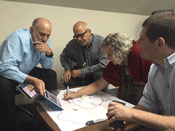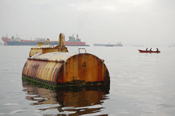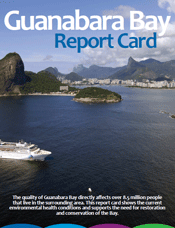Guanabara Bay report card initiated
 Alex Fries, Dave Nemazie, and Bill Dennison traveled to Rio de Janeiro, Brazil, for the initiation of a Guanabara Bay report card. IAN is partnering with KCI, a Maryland-based engineering firm, and PSAM, a municipal sanitation management agency in Rio. We actively participated in two workshops-a small technical workshop at INEA, which is an environmental agency based in Rio, and a large public workshop at the new Museum of Tomorrow, overlooking Guanabara Bay. Alex produced a draft newsletter in Portuguese which we used in the workshop at the Museum of Tomorrow. We will be returning to Rio in the coming months to complete the Guanabara Bay report card.
Alex Fries, Dave Nemazie, and Bill Dennison traveled to Rio de Janeiro, Brazil, for the initiation of a Guanabara Bay report card. IAN is partnering with KCI, a Maryland-based engineering firm, and PSAM, a municipal sanitation management agency in Rio. We actively participated in two workshops-a small technical workshop at INEA, which is an environmental agency based in Rio, and a large public workshop at the new Museum of Tomorrow, overlooking Guanabara Bay. Alex produced a draft newsletter in Portuguese which we used in the workshop at the Museum of Tomorrow. We will be returning to Rio in the coming months to complete the Guanabara Bay report card.
Exploring Guanabara Bay in route to a report card
 IAN staff headed back to Rio de Janeiro, Brazil for another stop in their journey to create the first Guanabara Bay Report Card. This visit included a workshop in Niteroi, a city across Guanabara Bay from Rio de Janeiro as well as a boat tour of the bay. The workshop included discussions reviewing values of and threats to the ecosystem, adding new indicators to the report, and presenting survey results from the previous workshop. Clear communication on the restoration of Guanabara Bay was identified as a key effort in stakeholder engagement, especially during the report card process. The boat tour showcased both the good and bad of Guanabara Bay, including fishing and pollution.
IAN staff headed back to Rio de Janeiro, Brazil for another stop in their journey to create the first Guanabara Bay Report Card. This visit included a workshop in Niteroi, a city across Guanabara Bay from Rio de Janeiro as well as a boat tour of the bay. The workshop included discussions reviewing values of and threats to the ecosystem, adding new indicators to the report, and presenting survey results from the previous workshop. Clear communication on the restoration of Guanabara Bay was identified as a key effort in stakeholder engagement, especially during the report card process. The boat tour showcased both the good and bad of Guanabara Bay, including fishing and pollution.
Guanabara Bay gets D in first report card!
 On July 21, 2017 the Guanabara Bay Report Card was released at the Museum of Tomorrow in Rio de Janeiro, Brazil. Dave Nemazie and Alexandra Fries released the report card with the help of Joao Coimbra and Bob Summers. The report card focused on water quality indicators for Guanabara Bay and its Basin. The Bay and Basin both received D grades, showing poor water quality throughout a region that supports almost 9 million inhabitants. The international spotlight was shown on Rio, and Guanabara Bay, during the Olympics last year, with the poor conditions evident. To clean up the bay, sewage treatment and proper trash collection and disposal are imperative. The report card is available online at guanabarabay.ecoreportcard.org.
On July 21, 2017 the Guanabara Bay Report Card was released at the Museum of Tomorrow in Rio de Janeiro, Brazil. Dave Nemazie and Alexandra Fries released the report card with the help of Joao Coimbra and Bob Summers. The report card focused on water quality indicators for Guanabara Bay and its Basin. The Bay and Basin both received D grades, showing poor water quality throughout a region that supports almost 9 million inhabitants. The international spotlight was shown on Rio, and Guanabara Bay, during the Olympics last year, with the poor conditions evident. To clean up the bay, sewage treatment and proper trash collection and disposal are imperative. The report card is available online at guanabarabay.ecoreportcard.org.